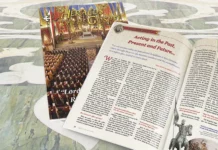God does not remove miseries, but sanctifies the miserable. In this way, the work of grace shines more brightly than if it were to fall on someone free from defects.
“Will God never answer me?” It is a question which from time to time surges up impetuously within us, especially at those times when we are praying earnestly to be cleansed from our miseries. We see ourselves free from some problem, and then another one appears on our horizon; or, worse still, we strive to overcome one defect and, barely having won the victory, we become aware of the existence of several others. To aggravate matters, in our daily life, we also find that others are in a similar situation…
So, in the end… does God hear our request or not?
Catholic doctrine teaches us that the Almighty One grants whatever we ask of Him in prayer, provided it will be for our good, the culmination of which is eternal glory in Paradise.1 Now, in most cases, great harm would be done to us if Divine Providence were to free us from our miseries and weaknesses.
This may sound absurd, but it is not.
An aid so as not to be ungrateful to God
To better understand the first basis for this affirmation, let us take an example from domestic life. Let us imagine that a mother wants to prepare an extraordinary party for her daughter, to commemorate her entrance into college. She invites the girl’s friends, takes great care in readying the house and secretly prepares a superb menu.
On the date set, the young girl is met with that wonderful surprise. The mother also has a start; but an unpleasant one. Her daughter simply refuses to touch anything that has been prepared. She shows no interest, and makes little of all the affection of her dedicated mother.
Would such an attitude not reveal terrible ingratitude?
Turning to the Gospel, we see the antithesis of this young woman: the lame, poor, crippled and blind who the rich man called to his feast (cf. Lk 14:21) and who partook eagerly in the sumptuous food served, showing that the more indigent the guest, the more apt he is to be lavished with gifts.
In an analogous way, if our physical or spiritual shortcomings were completely overcome, we would run the risk of mistakenly judging our needs to be met, and we would soon forget to seek the source of living water, the dispenser of heavenly gifts, the only one who can in fact satisfy our longings: God.
And, like that unappreciative young woman, we would easily fall into an abyss more terrible than sin: the lack of gratitude towards the Most High.
A blind child who sees without an optic nerve…
However, even when we are misguided in making our supplications, this does not mean that God will withhold His grace. If it is true that He always heeds us, surpassing our human and mediocre criteria, it is also true that He builds indestructible castles on the quagmire of miseries!
A little story may help us to better understand this second point of our considerations.
A virtuous couple gave birth to a long-awaited child to whom the parents spared no signs of affection. However, months passed and they noticed that something was wrong. They took him to the doctor and the diagnosis was devastating: the child was blind, because he lacked an optic nerve; mute, because he was born without vocal cords; and deaf, because he lacked an auditory canal. Distraught, they asked what they could do, but the specialist declared: “There is no solution!”
Back at home, the pious parents kept their spirits up, because there was one thing they did not lack, and that was faith. Laying the child on his lap, the father placed his hands on his head, and the two spouses, their eyes filled with hope, looked up to Heaven and prayed for the healing of their beloved little one.
Immediately, the child showed a completely different reaction. The gazes of the three crossed and an innocent smile appeared on the infant’s lips. Convinced of the miracle attained, the father could only exclaim, “Son!” To which the baby replied with a resounding “Papa!”
God, who is Father, is also Son and Love. He had listened with pleasure to the parents’ prayer and promptly answered them.
Without giving way to doubt, the couple rushed back to the physician to confirm the divine intervention. The response was astonishing: the child could see without an optic nerve, speak without vocal cords, and hear without an auditory canal. He was a miracle child!
Grace will work wonders of sanctity in us
This hypothetical case offers a pale image of what happens to those whom God sanctifies. Grace works in the soul, which is endowed with spiritual gifts; but the defects are not immediately removed, nor do the struggles or the diabolical onslaughts cease. In short, God does not remove the miseries, but sanctifies the miserable.

In this way, the supernatural work becomes more evident, shining more brightly than if it was focused on someone without faults. This explains the sufferings of so many Saints who, though they lived in an edifying way, gave themselves up to penance and prayer, shedding tears and imploring Heaven for strength, not only to face external adversities, but above all to conquer themselves.
St. Paul’s affirmation clearly proves this: “And to keep me from being too elated by the abundance of revelations, a thorn was given me in the flesh, a messenger of Satan, to harass me, to keep me from being too elated” (2 Cor 12:7). Does it not it seem strange that Satan should serve to deliver us from self-aggrandizement? God uses evil to obtain good, as the Apostle goes on to explain: “Three times I besought the Lord about this, that it should leave me; but He said to me, ‘My grace is sufficient for you, for My power is made perfect in weakness’” (2 Cor 12:8-9a).
Perhaps for this reason the Blessed Virgin at Lourdes has performed cures similar to that of the child in our story and, to symbolize this truth, Our Lord Jesus Christ wished to remain with His glorious wounds after the Resurrection.
The joy of weakness
The important thing is not to be discouraged when we are faced with our miseries, however repeatedly they manifest themselves, and under no circumstances should we capitulate in the battle against the world, the flesh and the devil.
We must be patient and persistent, certain that if we have confidence, grace will never cease to work in us. Mary Most Holy is not the Lady of unfinished works and, through Her, God will work wonders in us, poor cripples, who hope in His fatherly omnipotence.
In this way we will rightly cry out in unison with all the righteous of history: “I will all the more gladly boast of my weaknesses, that the power of Christ may rest upon me. For the sake of Christ, then, I am content with weaknesses, insults, hardships […]; for when I am weak, then I am strong” (2 Cor 12:9b-10)! ◊
Notes
1 Cf. CCC 2738-2741.







